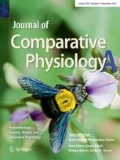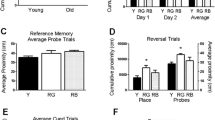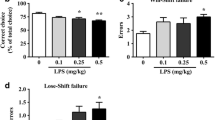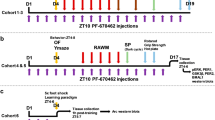Abstract
Protein kinase M zeta (PKMζ) and the kidney and brain protein (KIBRA) play important roles in various forms of memories. However, whether they are involved in performing the T-maze task is still unknown. In this study, the delayed nonmatch-to-sample (DNMS) task in a T-maze was given to rats. The percentage of correct choices denoting the performance accuracy was calculated and the protein levels of PKMζ and KIBRA in rat’s prefrontal cortex were measured. The results showed significantly increased performance accuracy after the training phase, which was maintained on the next day in groups with a delay of 10 s but not 30 s, indicating that 30 s is too long for rats to maintain working memory. As for the expressions of PKMζ and KIBRA, significant increases were observed 1 day after the training phase, indicating that the formation of reference memory accompanies an increase in PKMζ and KIBRA. No significant difference was found among groups with various delay intervals, indicating that the expressions of PKMζ and KIBRA exert no effects on the performance of working memory. These results provide the first evidence that KIBRA as well as PKMζ is closely related to reference memory but not working memory in rats.



Similar content being viewed by others
References
Becker JT, Morris RG (1999) Working memory(s). Brain Cogn 41:1–8
Büther K, Plaas C, Barnekow A, Kremerskothen J (2004) KIBRA is a novel substrate for protein kinase Cζ. Biochem Biophys Res Commun 317:703–707
Corneveaux JJ, Liang WS, Reiman EM, Webster JA, Myers AJ, Zismann VL, Joshipura KD, Pearson JV, Hu-Lince D, Craig DW, Coon KD, Dunckley T, Bandy D, Lee W, Chen K, Beach TG, Mastroeni D, Grover A, Ravid R, Sando SB, Aasly JO, Heun R, Jessen F, Kölsch H, Rogers J, Hutton ML, Melquist S, Petersen RC, Alexander GE, Caselli RJ, Papassotiropoulos A, Stephan DA, Huentelman MJ (2010) Evidence for an association between KIBRA and late-onset Alzheimer’s disease. Neurobiol Aging 31:901–909
Dalley JW, Cardinal RN, Robbins TW (2004) Prefrontal executive and cognitive functions in rodents: neural and neurochemical substrates. Neurosci Biobehav Rev 28:771–784
D’Esposito M (2007) From cognitive to neural models of working memory. Philos Trans R Soc Lond B Biol Sci 362:761–772
Dudchenko PA (2004) An overview of the tasks used to test working memory in rodents. Neurosci Biobehav Rev 28:699–709
Hardt O, Migues PV, Hastings M, Wong J, Nader K (2010) PKMζ maintains 1-day- and 6-day-old long-term object location but not object identity memory in dorsal hippocampus. Hippocampus 20:691–695
Hernandez AI, Blace N, Crary JF, Serrano PA, Leitges M, Libien JM, Weinstein G, Tcherapanov A, Sacktor TC (2003) Protein kinase Mζ synthesis from a brain mRNA encoding an independent protein kinase Cζ catalytic domain, Implications for the molecular mechanism of memory. J Biol Chem 278:40305–40316
Johannsen S, Duning K, Pavenstadt H, Kremerskothen J, Boeckers TM (2008) Temporal-spatial expression and novel biochemical properties of the memory-related protein KIBRA. Neuroscience 155:1165–1173
Lee AM, Kanter BR, Wang D, Lim JP, Zou ME, Qiu C, McMahon T, Dadgar J, Fischbach-Weiss SC, Messing RO (2013) Prkcz null mice show normal learning and memory. Nature 493:416–419
Li YQ, Xue YX, He YY, Li FQ, Xue LF, Xu CM, Sacktor TC, Shaham Y, Lu L (2011) Inhibition of PKMζ in nucleus accumbens core abolishes long-term drug reward memory. J Neurosci 31:5436–5446
Ling DS, Benardo LS, Serrano PA, Blace N, Kelly MT, Crary JF, Sacktor TC (2002) Protein kinase Mζ is necessary and sufficient for LTP maintenance. Nat Neurosci 5:295–296
Lisman J (2011) Memory erasure by very high concentrations of ZIP may not be due to PKM-ζ. Hippocampus 22:648–649
Makuch L, Volk L, Anggono V, Johnson RC, Yu Y, Duning K, Kremerskothen J, Xia J, Takamiya K, Huganir RL (2011) Regulation of AMPA receptor function by the human memory-associated gene KIBRA. Neuron 71:1022–1029
Markowitsch HJ, Pritzel M (1977) Comparative analysis of prefrontal learning functions in rats, cats, and monkeys. Psychol Bull 84:817–837
Migues PV, Hardt O, Wu DC, Gamache K, Sacktor TC, Wang YT, Nader K (2010) PKMζ maintains memories by regulating GluR2-dependent AMPA receptor trafficking. Nat Neurosci 13:630–634
Milnik A, Heck A, Vogler C, Heinze HJ, de Quervain DJ, Papassotiropoulos A (2012) Association of KIBRA with episodic and working memory: a meta-analysis. Am J Med Genet B Neuropsychiatr Genet 159B:958–969
Mizoguchi K, Yuzurihara M, Ishige A, Sasaki H, Chui DH, Tabira T (2000) Chronic stress induces impairment of spatial working memory because of prefrontal dopaminergic dysfunction. J Neurosci 20:1568–1574
Mizoguchi K, Ishige A, Takeda S, Aburada M, Tabira T (2004) Endogenous glucocorticoids are essential for maintaining prefrontal cortical cognitive function. J Neurosci 24:5492–5499
Mizoguchi K, Shoji H, Tanaka Y, Maruyama W, Tabira T (2009) Age-related spatial working memory impairment is caused by prefrontal cortical dopaminergic dysfunction in rats. Neuroscience 162:1192–1201
Muslimov IA, Nimmrich V, Hernandez AI, Tcherepanov A, Sacktor TC, Tiedge H (2004) Dendritic transport and localization of protein kinase Mζ mRNA: implications for molecular memory consolidation. J Biol Chem 279:52613–52622
Nishizuka Y (1995) Protein kinase C and lipid signaling for sustained cellular responses. FASEB J 9:484–496
Pastalkova E, Serrano P, Pinkhasova D, Wallace E, Fenton AA, Sacktor TC (2006) Storage of spatial information by the maintenance mechanism of LTP. Science 313:1141–1144
Sacktor TC (2010) PINing for things past. Sci Signal 3:pe9
Sacktor TC (2011) How does PKMζ maintain long-term memory? Nat Rev Neurosci 12:9–15
Sanes JR, Lichtman JW (1999) Can molecules explain long-term potentiation? Nature Neurosci 2:597–604
Schneider A, Huentelman MJ, Kremerskothen J, Duning K, Spoelgen R, Nikolich K (2010) KIBRA: a new gateway to learning and memory? Front Aging Neurosci 2:4
Serrano P, Yao Y, Sacktor TC (2005) Persistent phosphorylation by protein kinase Mζ maintains late-phase long-term potentiation. J Neurosci 25:1979–1984
Serrano P, Friedman EL, Kenney J, Taubenfeld SM, Zimmerman JM, Hanna J, Alberini C, Kelley AE, Maren S, Rudy JW, Yin JC, Sacktor TC, Fenton AA (2008) PKMζ maintains spatial, instrumental, and classically conditioned long-term memories. PLoS Biol 6:2698–2706
Shema R, Sacktor TC, Dudai Y (2007) Rapid erasure of long-term memory associations in the cortex by an inhibitor of PKMζ. Science 317:951–953
Touzani K, Puthanveettil SV, Kandel ER (2007) Consolidation of learning strategies during spatial working memory task requires protein synthesis in the prefrontal cortex. Proc Natl Acad Sci USA 104:5632–5637
Volk LJ, Bachman JL, Johnson R, Yu Y, Huganir RL (2013) PKM-ζ is not required for hippocampal synaptic plasticity, learning and memory. Nature 493:420–423
Wu-Zhang AX, Schramm CL, Nabavi S, Malinow R, Newton AC (2012) Cellular pharmacology of protein kinase Mζ (PKMζ) contrasts with its in vitro profile: implications for PKMζ as a mediator of memory. J Biol Chem 287:12879–12885
Yao Y, Shao C, Jothianandan D, Tcherepanov A, Shouval H, Sacktor TC (2013) Matching biochemical and functional efficacies confirm ZIP as a potent competitive inhibitor of PKMζ in neurons. Neuropharmacology 64:37–44
Yoshihama Y, Chida K, Ohno S (2012) The KIBRA-aPKC connection: a potential regulator of membrane trafficking and cell polarity. Commun Integr Biol 5:146–151
Acknowledgments
This work was supported by a grant from the Kaohsiung Medical University Research Foundation (KMU-M110003), Taiwan. All experimental procedures have been reviewed and approved by the Animal Care and Use Committee of the Kaohsiung Medical University.
Author information
Authors and Affiliations
Corresponding author
Rights and permissions
About this article
Cite this article
Wang, DC., Liu, PC., Hung, HS. et al. Both PKMζ and KIBRA are closely related to reference memory but not working memory in a T-maze task in rats. J Comp Physiol A 200, 77–82 (2014). https://doi.org/10.1007/s00359-013-0862-2
Received:
Accepted:
Published:
Issue Date:
DOI: https://doi.org/10.1007/s00359-013-0862-2




